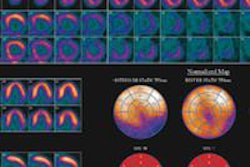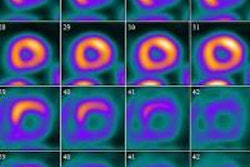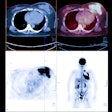Canadian researchers have found that PET scans with the radiopharmaceutical rubidium-82 can predict major adverse cardiac events independent of other parameters, according to results published online August 9 in the Journal of the American College of Cardiology.
The study, from the University of Ottawa Heart Institute, indicates that assessment of myocardial flow reserve with rubidium-82 PET could improve risk evaluation for patients being investigated for ischemia.
Lead study author Dr. Maria Ziadi and colleagues from the university's National Cardiac PET Centre and Cardiovascular Research Methods Centre prospectively enrolled 704 consecutive patients and divided them into four groups:
- Group 1: Normal summed stress score < 4 and normal myocardial flow reserve > 2
- Group 2: Normal summed stress score and myocardial flow reserve < 2
- Group 3: Summed stress score ≥ 4 and myocardial flow reserve ≥ 2
- Group 4: Summed stress score ≥ 4 and myocardial flow reserve < 2
All patients received 3D PET scans (Discovery RX/VCT, GE Healthcare) and 10 MBq/kg of rubidium-82 administered intravenously. Follow-up information was acquired for 677 (96%) of 704 patients, with a median follow-up of 387 days (JACC, August 9, 2011).
Among the 677 follow-up patients, there were 27 hard events (4%), 12 cardiac deaths (2%), and 16 nonfatal myocardial infarctions (3%).
For major adverse cardiac events, there were 71 first events (71 patients, 11%). Among those 71 patients, 20 (28%) underwent late revascularization as first events. Twenty-nine patients were admitted, with 13 (18%) experiencing congestive heart failure, 15 (21%) with acute coronary syndrome, and one (1.4%) with chest pain and subsequent acute coronary syndrome.
The comparison of patients with a normal summed stress score and those with an abnormal score showed "significant differences" in outcomes for cardiac events, such as cardiac death and myocardial infarction, between patients with myocardial flow reserve of 2 or greater and those with myocardial flow reserve less than 2.
Routine integration of rubidium-82 myocardial flow reserve with relative myocardial perfusion imaging (MPI) "could represent a valuable tool for the clinician to better stratify a patient's risk of adverse cardiac events," Ziadi and colleagues wrote. "Abnormal rubidium-82 [myocardial flow reserve] means worse outcomes in any category of relative MPI, and this could affect management decisions for these patients."




















